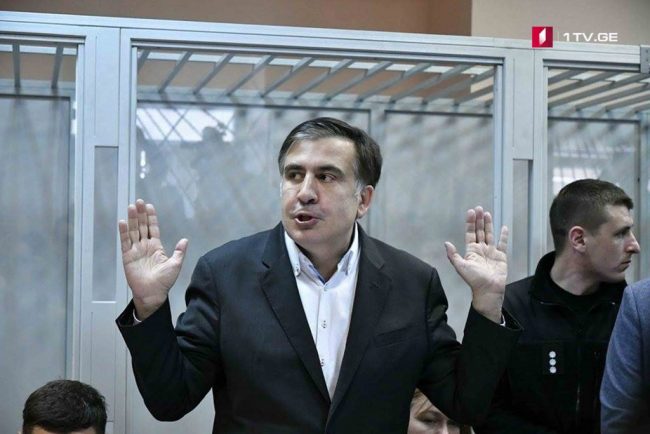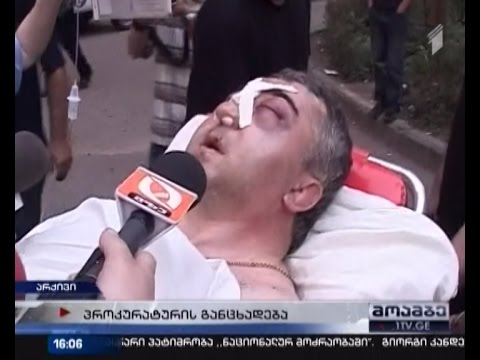
 Tbilisi City Court sentenced former Georgian President Mikheil Saakashvili to eight years in prison in absentia on Thursday, commuted to six years due to a 2012 amnesty, for ordering the attack on businessman and opposition MP Valeri Gelashvili in 2005. Saakashvili was found guilty on two counts: exceeding his official authorities with the application of violence and arms, and organising intentional damage that afflicted grave bodily harm dangerous to one’s life, irreversibly altering one’s face. The Court also banned him from public office for two years and three months.
Tbilisi City Court sentenced former Georgian President Mikheil Saakashvili to eight years in prison in absentia on Thursday, commuted to six years due to a 2012 amnesty, for ordering the attack on businessman and opposition MP Valeri Gelashvili in 2005. Saakashvili was found guilty on two counts: exceeding his official authorities with the application of violence and arms, and organising intentional damage that afflicted grave bodily harm dangerous to one’s life, irreversibly altering one’s face. The Court also banned him from public office for two years and three months.
Valeri Gelashvili, an MP from the Industry Will Save Georgia Party, was attacked in Tbilisi on 14 July 2005 resulting in serious injuries to his face. The prosecution successfully argued that a conflict between Gelashvili and Saakashvili over the former’s house, culminating in Gelashvili making comments to the press about the then president’s personal life, led Saakashvili to seek vengeance. The prosecution claimed Saakashvili ordered then-Interior Minister Vano Merabishvili and the Special Operation Department, headed by Erekle Kodua, to beat up Gelashvili.
Vano Merabishvili was sentenced to six years and nine months for the same crime in September 2016, while former Interior Ministry officials Erekle Kodua and Giorgi Siradze were sentenced to nine years in prison the same year.
Speaking to Rustavi 2, Saakashvili called the court ruling ‘a clown show’ that had nothing to do with the law. The former president connected his conviction to former Prime Minister Bidzina Ivanishvili’s wish not to see him in Georgia. ‘He will do anything so that I, the maker of the modern Georgian state, can not come to Georgia’.
Nika Melia, one of the leaders of the United National Movement (UNM), of which Saakashvili is the head, made a similar statement, saying the Prosecutor’s Office and the court, ‘under the dictate’ of Ivanishvili, ‘would have sentenced Saakashvili to death if it was available in the criminal code’.

In her September 2017 testimony to the court, Burjanadze claimed Saakashvili told her in a private meeting that Gelashvili was attacked due to the offensive newspaper article. On Friday, Saakashvili, currently residing in Amsterdam, stated that the ‘whole sentence’ was based on Burjanadze’s testimony. Saakashvili called this ‘absurd’, arguing that he would never have shared such information with Burjanadze, even if he had ordered an attack, as ‘no one trusted her’ in his team.
In October 2007, after a conflict with his former political allies, Okruashvili gave a scandalous TV interview in which he identified Saakashvili and Merabishvili as the organisers of the attack.
In her ruling, judge Shorena Guntsadze rejected the possibility that the conviction was politically motivated, noting that the investigation into the case launched in July 2005 was stopped after two months, despite the victim, a sitting opposition MP, claiming to have been attacked by the security services.
According to his representative, Tamaz Rukhadze, Gelashvili thought Saakashvili should have been convinced of the maximum 12 years in prison, and is also considering seeking financial compensation.
Second conviction
The ruling was Saakashvili’s second prison sentence in absentia. On 5 January, he sentenced to 3 years in prison for abuse of official power connected to the murder of Sandro Girgvliani. Tbilisi City Court found him guilty of illegally promising to pardon the head of the Constitutional Security Department, Data Akhalaia, as well as ultimately pardoning 4 law enforcement officers convicted of Girgvliani’s murder. Girgvliani was killed in January 2006 after an alleged argument with then-Interior Minister Vano Merabishvili’s wife Tako Salakaia.
After leaving the country following his party’s defeat in 2012 parliamentary elections, Saakashvili has been a person of interest in a number of high-profile investigations launched by the Georgian authorities. This included the 2007 crackdown on protests in Tbilisi and the raid on opposition leaning TV channel Imedi. Officials attempted to seek Saakashvili’s extradition, but in 2015, Interpol refused to include him on their list, and Ukraine also refused to hand him over.




 29 June 2018
29 June 2018


